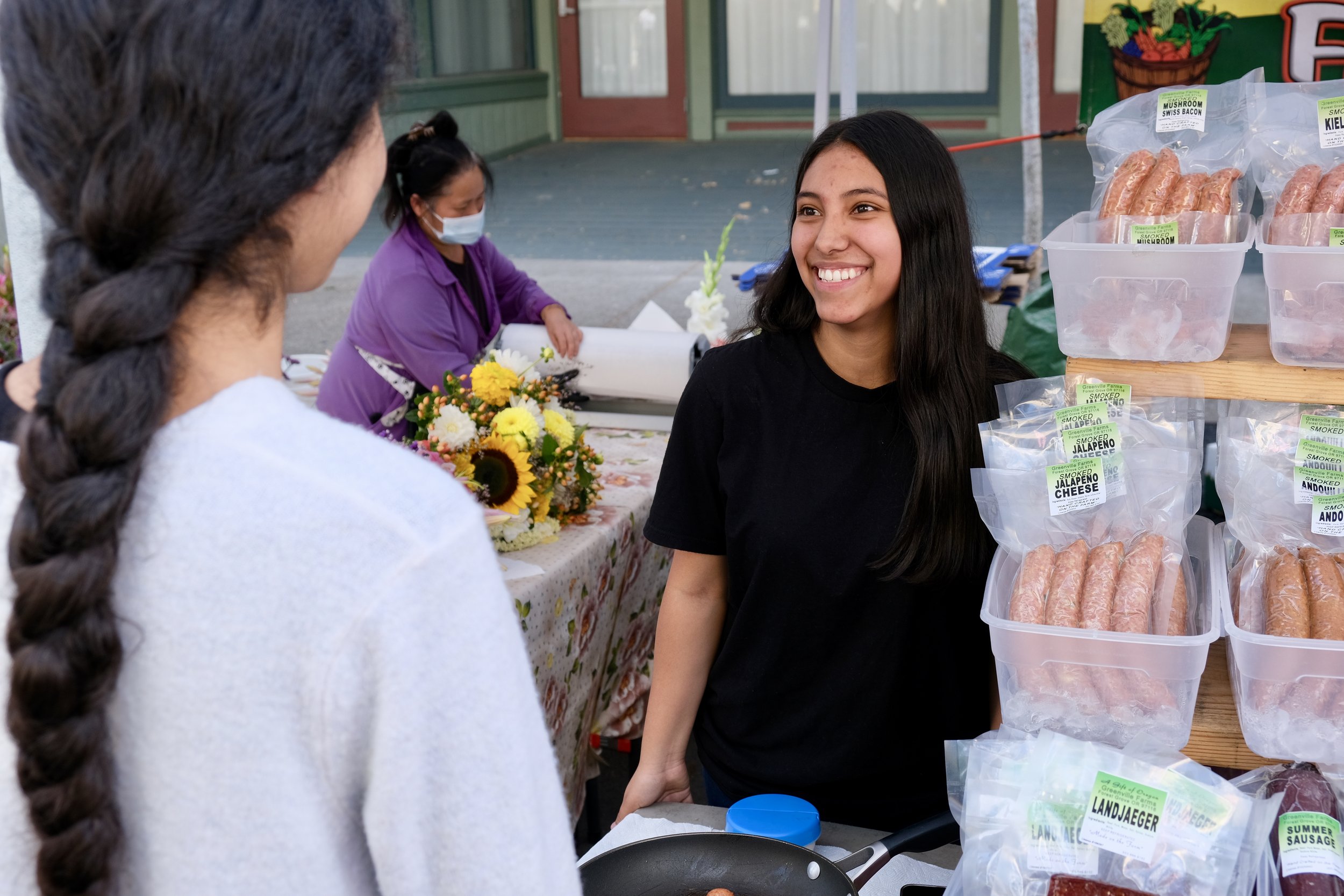Agriculture & Land Access
The Regenerative Agriculture program promotes the recovery and application of ancestral natural regenerative production techniques to grow vegetables. Likewise, it enables the Latine farmer to successfully market their products.
Cultivating the Future!
Next cohort:
Mondays
Date: March 17 to June 1st, 2025
Time: 6:30-8:30 p.m.
Place: Adventist Church (1165 SE Walnut St. Hillsboro, OR 97123)
Learn how to cultivate your own healthy and nutritious foods. The course consists of 14 classes, including two field practices, and is entirely in Spanish. Classes are taught in Spanish.
In these classes, you will learn:
The secret to producing healthy vegetables.
Soil regeneration and conservation.
Cover crops and green fertilizers.
What plants need.
Weeds, friends or foes?
Integrated pest management.
The relationship between water, soil, and plants.
How to compost, and much more.
Cost: $50 per family, but all adults must fill out the registration form. Current Adelante Mujeres participants receive a 50% discount.
For more informationContact:
Alejandro Tecum at (503) 707 5945 or email: atecum@adelantemujeres.org
Javier Urenda at (503) - 660 2124 or email jurenda@adelantemujeres.org
*Space for these classes will be limited.
*Childcare available!
Program Components
The Agriculture and Land Access Program teaches closed-loop growing and other best farming practices to new and beginning Latine farmers and members of the Latine community interested in growing their own food and improving the health of their families and community.
Regenerative Agriculture Course
This 14-week, Spanish language course for new and aspiring farmers and gardeners teaches participants how to create and manage a small-scale, diversified organic farm or garden. Topics covered include soil regeneration, nutrient needs, cover crops, ecological pest control, and much more.
Farm Business One-on-One Coaching
Alumni of the Regenerative Agriculture Course receive individualized technical assistance, coaching, and mentorship from our staff. Coaching topics include business planning, marketing, production, and more.
Farm Specialty Workshops
Our team provides ongoing trainings based on trends in the agriculture industry. Past topics have included insect management, fruit tree pruning, making compost, and germinating seeds.
Access to Farmers Markets & Capital
Adelante Mujeres provides access to a wide customer base through our long-standing Farmers Market, which serves as a small business incubator for our participants who build farm businesses.
Community Garden and Land Access Support
Participants of the program will also receive support with securing community garden space or land to grow their personal food supply and/or produce for their farm business.
Food Pantries
From June through October, families in our Early Childhood Education and Produce RX Programs can receive weekly food vouchers for our Farmers Markets. After the market season ends, the food pantry will be housed inside the Adelante Mujeres building.
Program Strategies
Our Agriculture and Food Sovereignty Program works to address the immediate problems of hunger, malnutrition, food insecurity, economic insecurity, and environmental degradation. We are working towards the structural changes needed to turn regenerative, equitable, and democratic food systems into the norm rather than a collection of projects.
Food Justice
The inequities and injustices of the corporate food regime are the default reality of our current system, and the history of land-based oppression and forced migration have disconnected Latine communities from the land. We all deserve the right to grow, distribute, access, and eat healthy food — regardless of race, class, gender, ethnicity, citizenship, ability, religion, or community. A dedicated effort to the food justice principles of anti-racism and equity within the food movement is foundational to working for justice in the food system.
Positive Impacts on our Land and Climate
Industrial agriculture is responsible for 24% of greenhouse gas emissions and 70% of water use, and one-third of the world’s topsoil is already acutely degraded. Environmental impacts of climate change, pesticide exposure, and toxic pollutants harm communities of color disproportionately. Our programming focuses on regenerative farming techniques, which reverse climate change by rebuilding soil organic matter. No matter how big your plot of land is, you can help reverse industrial agriculture’s damaging effects on the plantet and on vulnerable communities.
Popular Education
Our agriculture classes and workshops utilize a Popular Education approach, which breaks down the barrier between teacher and student, recognizing that everyone brings knowledge through life experience. We respect the wealth of knowledge and expertise that everyone brings to the classroom.
Culturally- Responsive
We are committed to the inclusion of communities of color and underserved communities by embedding culturally-responsive practices at all levels of our work. We teach our participants to see their cultural food and agriculture traditions as a solution to feeding the world.
During 2020 - 2021:
39
participants graduated from the Regenerative Agriculture Course.
300
hours of one-on-one coaching were provided to participants.
32
participants received community garden and land access support.
Why Agriculture and Food Sovereignty?
Did you know that 85% of the people working the land in the U.S. are Latine migrant workers, yet only 2.5% of farms are owned and operated by Latines? Land-based oppression, soil and climate degradation, and a fragile and inequitable food system all impact the livelihoods of Latine families in Oregon. Our Agriculture and Food Sovereignty Program joins a movement to fundamentally change the existing agriculture paradigm. With regenerative growing practices, we are rediscovering systems that mimic nature’s regenerative force, helping to mitigate climate change. And by empowering Latine growers to create their own local food supply, and/or start small farming businesses, land-based oppression diminishes.











